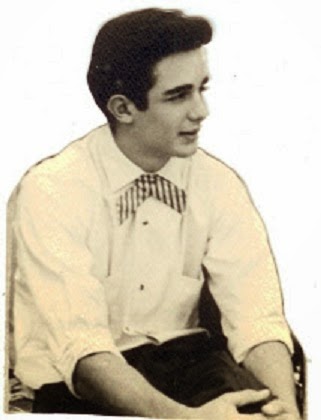Oh
Captain...My Father Emilio Torres.
By Arlette
Torres
I am 12 year
old again. It is Mexican time. Eternal illusion. Past, present, future
suspended in amber.
My father's
hand grasps mine. We walk briskly on a busy street in Torreón Coahuila, México.
Ahead, an
elderly blind man sits on the filthy sidewalk outside a shoe store. He asks for
metal mercy, copper confetti. The man holds a can between his ruined brown
hands, crumpled like ancient parchment paper.
The young
thug came like a left jab. Boxers work in milliseconds. He kicked the can from
the old man's hands. I didn't see the blow. I heard the guy yell:
"Gooool!" The thug ran. His blasé cruelty remained, thickened the air
and made ribbons of my entrails.
The elderly
man sat. Blind. His hands shaking softly while coins flew everywhere. The sting
of his humiliation slit my eyelids. Tears welled between my skin and my soul.
Before water spilled, my father sprang forward. Feral speed. Fierce grace.
Senses refined. I saw my father become deadly. He excreted ferocity. I felt
lightheaded; didn't want to see what came next.
But my
father didn't chase the thug. Instead, he kneeled next to the blind man.
I went
looking: around the newspaper stand and the lottery stand and the phone booth.
The coins would not be reclaimed. They became part of the filthy pavement. The
blind gentleman lost. Then my father gestured. "Come here, Arlette."
He pulled me down, held the old man's hands between his own. Then he
leaned forward and whispered in his ear. Those pupils, veiled and milky bluish
danced they danced... he was alive.
Dad handed
me something round, cold. He told the elderly man, "Don Eufrasio this is
from my daughter. Take it and go home. I'll be watching." I squeezed the
thing, placed it between those ancient palms, the cartography of our suffering
collected in each deeply etched line. His skin was thick though, not delicate.
He held on to my fat square hands. I waited. My father added his hands around
mine and he knitted the tears that were and would be.
We stood up,
walked away quickly hand in hand. Stopped at the corner. I looked back. Don Eufrasio
sat on his cardboard. He was beautiful, petrified, luminous. His face remained
turned toward us. Could he see us? Yes he saw us and then through us and beyond
to a place only he knew.
Dad smoked.
We waited. A couple of hours passed. Finally Don Eufrasio's grandson came to
collect his grandfather, who tripped over words, yelling, smiling, shaking
disbelief from his dry bones. The young man looked over at us. He nodded,
discombobulated by his grandfather's wild gestures. They left. We
left. Dad drove slowly. I broke the
silence. "Papá, is Don Eufrasio your friend?" My father looked over
and smiled with sad divinity. "Don Eufrasio was not my friend. But now we
are. His friends."
At home, my
mother scrutinized dad. Something was missing. Aha. She finally knew what was
off.
"Emilio
where is that ghastly gold Centenario you hang from your keychain?" Dad's
Centenario, that cold, round thing. A fifty peso solid gold coin bearing the
Angel of Independence, worth around $2100 dollars today. Dad looked at her.
"Oh I got tired of it. I sold it. Gold prices are good." My father
lied. My mother
believed. I kicked ethics in the teeth. "Good. I don't know why you like
to use them as keychain charms. They're so vulgar...ostentatious really."
That night
my father sat across from me, elbows on his knees. He seemed somehow different.
Human. Tired. Small. Beautiful leviathan. Endless. His eyes filled with crystalline
belief and spoke:
"Never
sell something you can give away Arlette."
My father
died two years later. I was fourteen. His death the guillotine of my life.
Before and after.
Don Eufrasio
is also dead. I am 42. My hands are dirty and empty. Yet sometimes I feel pure
because my father comes to fill them. I cup them tightly around his endless
pour and then spread my fingers, giving it all away.


No comments:
Post a Comment